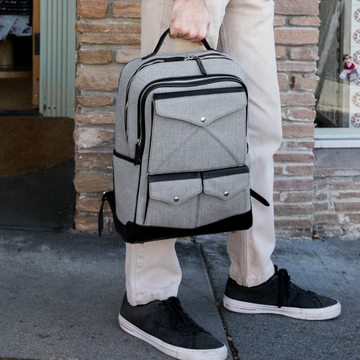In recent years, the fashion industry has faced increasing pressure to adopt more sustainable practices, and one area where significant strides have been made is in bag manufacturing. As consumers become more environmentally conscious, there is a growing demand for bags that not only look stylish but also minimize harm to the planet. In this article, we'll delve into some of the most promising eco-friendly alternatives in bag manufacturing and explore how they are reshaping the industry landscape.
Recycled Materials:
One of the most prominent trends in eco-friendly bag manufacturing is the use of recycled materials. Companies are repurposing materials like plastic bottles, old fabrics, and even discarded fishing nets to create durable and stylish bags. By giving new life to these materials, manufacturers are reducing waste and minimizing their environmental footprint.
Organic Fabrics:
Another sustainable option gaining popularity is the use of organic fabrics such as organic cotton, hemp, and bamboo. These materials are grown without the use of harmful pesticides and chemicals, making them safer for the environment and the workers involved in the production process. Organic fabrics also tend to be more durable, ensuring that eco-friendly bags last longer and contribute less to landfill waste.
Vegan Leather:
Traditional leather production has long been associated with environmental degradation and animal cruelty. In response, many manufacturers are turning to vegan leather alternatives made from materials like cork, pineapple leaves (Pinatex), and apple skins. Not only are these materials cruelty-free, but they also require fewer resources to produce, making them a more sustainable choice for conscientious consumers.
Biodegradable Plastics:
While traditional plastics pose a significant threat to the environment, advancements in technology have led to the development of biodegradable plastics derived from renewable sources such as cornstarch and sugarcane. Bags made from these materials break down naturally over time, reducing the amount of plastic pollution in oceans and landfills.
Upcycled Materials:
Upcycling involves repurposing discarded materials or products to create new items of higher value. In the context of bag manufacturing, this could mean transforming old denim jeans into trendy backpacks or turning surplus industrial fabrics into chic tote bags. Upcycling not only reduces waste but also encourages creativity and innovation in design.
Minimalist Design Philosophy:
In addition to using eco-friendly materials, many bag designers are embracing minimalist design principles to create products that are both timeless and sustainable. By focusing on simplicity and functionality, these bags eschew unnecessary embellishments and excess packaging, resulting in less waste and a smaller environmental footprint.
Fair Trade Practices:
Beyond materials, sustainable bag manufacturing also encompasses fair trade practices. This involves ensuring that workers involved in the production process are paid fair wages and operate in safe working conditions. By prioritizing fair trade, companies can support local communities and promote social justice within the industry.
Carbon Neutral Initiatives:
Some forward-thinking companies are going the extra mile by implementing carbon-neutral initiatives in their manufacturing processes. This may involve offsetting carbon emissions through tree planting programs, investing in renewable energy sources, or optimizing transportation logistics to reduce environmental impact.
Conclusion
The shift towards eco-friendly alternatives in bag manufacturing represents a positive step towards a more sustainable fashion industry. By embracing recycled materials, organic fabrics, vegan leather, biodegradable plastics, upcycling, minimalist design, fair trade practices, and carbon-neutral initiatives, manufacturers can meet the growing demand for environmentally conscious products while reducing their impact on the planet. As consumers, we have the power to drive this change by supporting brands that prioritize sustainability and making informed choices about the products we buy. Together, we can create a more sustainable future for fashion and the planet.
FAQs
What are eco-friendly bags?
Eco-friendly bags are bags that are produced using materials and manufacturing processes that have minimal impact on the environment. These bags are often made from recycled materials, organic fabrics, vegan leather alternatives, or biodegradable plastics.
Why are eco-friendly bags important?
Eco-friendly bags are important because they help reduce the environmental impact of traditional bag manufacturing processes. By using sustainable materials and practices, eco-friendly bags minimize pollution, conserve resources, and promote a healthier planet.
What materials are commonly used in eco-friendly bag manufacturing?
Common materials used in eco-friendly bag manufacturing include recycled materials such as plastic bottles and old fabrics, organic fabrics like organic cotton, hemp, and bamboo, vegan leather alternatives such as cork and pineapple leaves (Pinatex), and biodegradable plastics derived from renewable sources like corn starch and sugarcane.
How do eco-friendly bags contribute to sustainability?
Eco-friendly bags contribute to sustainability by reducing waste, minimizing pollution, and conserving natural resources. By using recycled materials, organic fabrics, and biodegradable plastics, eco-friendly bags help mitigate the environmental impact of traditional bag manufacturing processes.
Are eco-friendly bags durable?
Yes, many eco-friendly bags are designed to be durable and long-lasting. Bags made from recycled materials, organic fabrics, and vegan leather alternatives are often as sturdy and resilient as their conventional counterparts, ensuring that they can withstand daily use while still being environmentally friendly.
Are eco-friendly bags more expensive?
Eco-friendly bags may be slightly more expensive than conventional bags due to the higher costs associated with sustainable materials and manufacturing processes. However, the long-term benefits to the environment and the potential for durability and longevity often justify the higher initial cost.
Where can I buy eco-friendly bags?
Eco-friendly bags can be purchased from a variety of retailers, both online and in stores. Many brands specializing in sustainable fashion offer eco-friendly bag options, and there are also dedicated eco-friendly and zero-waste stores that carry a wide selection of environmentally conscious bags. Additionally, if you are looking for high-quality products, you can check out Luna Bags store, which offers a range of eco-friendly bag options.







